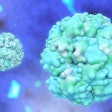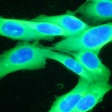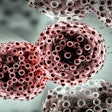
Cancer patients in the U.K. are receiving an experimental mRNA therapy designed to help their bodies recognize and fight cancer cells.
Researchers are evaluating the safety of the Moderna-made mRNA-4359 vaccine and its potential for treating melanoma, lung cancer, and other solid-tumor cancers in the Mobilize clinical trial, which is recruiting globally.
A team at Imperial College London and clinical staff at Imperial College Healthcare NHS Trust have set up the first clinical site in the U.K. to test the potential for “off the shelf” messenger RNA (mRNA) cancer immunotherapies.
The first patients have begun receiving the treatment at the National Institute for Health and Care Research (NIHR) Imperial Clinical Research Facility at Hammersmith Hospital in west London.
The mRNA-4359 treatment was designed using messenger RNA (mRNA) and works by presenting common markers of tumors to the patient’s immune system. This not only should help train patients’ immune systems to recognize and fight cancer cells expressing these markers, but also potentially eliminate cells that may suppress the immune response.
At this stage, the Mobilize study is assessing if the new mRNA therapy is safe and tolerated by patients either administered alone or in combination with pembrolizumab, an existing cancer drug which is a type of immune checkpoint inhibitor.
The study will also examine whether the combination of treatments can actively shrink tumors in patients with certain types of lung and skin cancer.
“New mRNA-based cancer immunotherapies, such as mRNA-4359, offer a new avenue for recruiting the patient’s own immune system to fight their cancer,” said Dr. David Pinato, a consultant medical oncologist and investigator with the trial’s U.K. arm.
"This research is still in the early stages and may be a number of years from being available to patients, but this trial is laying crucial groundwork that is moving us closer towards new therapies that are potentially less toxic and more precise. We desperately need these to turn the tide against cancer,” he added.
Several anticancer mRNA-based immunotherapies aimed at treating cancer cells that can become resistant to drugs are in development. All are in the early phases of clinical testing for safety and feasibility.
Preclinical testing in both cell and animal models of cancer has provided initial evidence that mRNA-4359 had an effect on the immune system, providing a rationale for it to be offered in early-phase clinical trials.
The Mobilize study is a Phase I/II, nonrandomized open-label trial. It is sponsored by Moderna and is set to recruit patients globally over the next three years.
Moderna’s checkpoint cancer vaccine candidate (mRNA-4359) expresses indoleamine dioxygenase (IDO) and programmed death-ligand 1 (PD-L1) antigens. It seeks to stimulate effector T cells that target and kill suppressive immune and tumor cells that express target antigens.
Dr. Nichola Awosika, a member of Imperial’s clinical research delivery team praised the study volunteers, saying, “It’s exciting to be involved with the Mobilize trial and provide the first doses to patients in the U.K.”
Peter Johnson, national clinical director for cancer for the U.K.’s national health service (NHS) said the NHS was in the “vanguard” of trials of cancer vaccines.
“Access to these groundbreaking trials—alongside other innovations to diagnose and treat cancers earlier—provides hope, and we expect to see thousands more patients taking part in trials of this kind over the next few years,” he said.



















